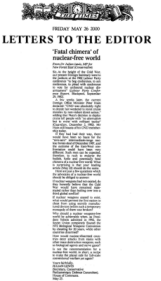The Times – 26 May 2000
 At the height of the Cold War, our present Foreign Secretary went to the podium at the 1982 Labour Party conference "to beg conference, to ask conference, to plead with conference to vote for unilateral nuclear disarmament" (Labour Party Conference Report, Blackpool, September 29, 1982).
At the height of the Cold War, our present Foreign Secretary went to the podium at the 1982 Labour Party conference "to beg conference, to ask conference, to plead with conference to vote for unilateral nuclear disarmament" (Labour Party Conference Report, Blackpool, September 29, 1982).
A few weeks later, the current Foreign Office Minister Peter Hain declared: "CND was absolutely right to decide last weekend to resist cruise missiles by non-violent direct action," adding that Nato's decision to deploy cruise left people with "no alternative but to resist with militant tactics" (Guardian, December 2, 1982). Mr Hain still boasts of his CND membership today.
If they had had their way, there would have been no basis for the "zero-zero" intermediate-range nuclear forces deal of December 1987, and the outcome of the East-West confrontation could have been very different. Such men can be expected, therefore, to rush to endorse the foolish, futile and potentially fatal chimera of a nuclear-free world. What is surprising is that your leading article (May 22) should do the same.
Here are just a few questions which the advocates of a nuclear-free world should be obliged to answer:
If nuclear weapons had not existed, do they honestly believe that the Cold War would have remained stalemated rather than boiling over into a third global conflict?
If nuclear weapons ceased to exist, what would prevent the first nation to cheat from using secretly manufactured devices before such a temporary monopoly of them was broken?
Why should a nuclear weapons-free world be achievable when, as President Yeltsin admitted in 1992, the Soviet Union completely flouted the 1972 Biological Weapons Convention by cheating for 20 years, while other countries disarmed?
How would nuclear-disarmed countries deter attacks from states with other mass destruction weapons, such as biological agents and nerve gases?
Is not the recommendation for a nuclear-free world, in short, a recipe to make the planet safe for full-scale conventional warfare yet again?
Dr JULIAN LEWIS MP
(Secretary, Conservative Parliamentary Defence Committee)
House of Commons
London SW1
* * * *
SUBSEQUENT CORRESPONDENCE:
(i) 'A WORLD WITHOUT NUCLEAR WEAPONS' – 2 June 2000
From Professor Sir Joseph Rotblat, FRS
Dr Julian Lewis (letter, May 26) attempts to convince us that nuclear arsenals must be retained. He fails to mention the perilous consequences of this policy, for which there is factual evidence.
One of these is proliferation. The proponents of a nuclear-weapon-free world have long argued that, if some states insist on keeping nuclear arsenals for their security, other states are bound to seek such security for themselves through the acquisition of nuclear weapons. The nuclear tests by India and Pakistan proved the validity of this argument. More states, notably in the Middle East, are seeking to join the nuclear club.
Another consequence is the knowledge, which we have had for 55 years, of the terrible effects of the atom bomb. The perils of the use of nuclear weapons in combat are so great that even a very low probability of the nuclear deterrent failing is unacceptable. As Robert McNamara has put it succinctly: "The indefinite combination of nuclear weapons and human fallibility will lead to a nuclear exchange."
I am not claiming that a nuclear-weapon-free world would be absolutely safe. There is no such thing as absolute safety. But there is no doubt in my mind that, of the two alternatives, a world without nuclear weapons would be safer than a world with them.
This is why the five nuclear weapon powers have now reaffirmed their "unequivocal" commitment to the elimination of nuclear weapons (report, May 22). To implement this commitment, certain steps (such as taking warheads off alert and a no-first-use treaty) should be taken immediately, followed by negotiations on the terms of a convention to abolish nuclear weapons, backed up with a verifiable safeguards system.
JOSEPH ROTBLAT
8 Asmara Road
London NW2
(ii) 'NUCLEAR DISARMAMENT' – 6 June 2000
From Lord Chalfont
Sir Joseph Rotblat's response (letter, June 2) to Dr Julian Lewis's letter (May 26) rehearsed all the old Cold War arguments for nuclear disarmament without answering any of Dr Lewis's pertinent questions.
There are now eight countries known to possess nuclear weapons and four others believed to be developing them. There are 17 countries with either chemical or biological programmes, or both. There are 36 countries, including many possessing nuclear, biological or chemical weapons, which have ballistic missiles capable of delivering them.
This is, as Sir Joseph rightly says, a dangerous world - indeed much more dangerous than the relatively simple one of bipolar confrontation to which his arguments are more relevant. Even those who reject Dr Lewis's persuasive argument that a nuclear-free world would make conventional warfare more likely must answer some searching questions. Sir Joseph Rotblat talks of "a verifiable safeguards system". Does he really believe this is possible in the current international environment?
It is a well-worn but still incontrovertible truth that the genie cannot be put back in the bottle and the clandestine development of weapons of mass destruction is now relatively cheap and simple.
Rather than being seduced by the unattainable and possibly dangerous dream of a nuclear-free world, it would be wiser to develop effective defences against the missiles which might be used to deliver weapons of mass destruction against our Armed Forces or their bases, both overseas and at home.
CHALFONT
House of Lords
London SW1